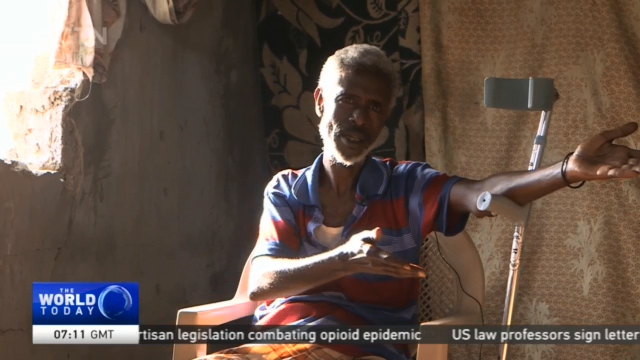
15:45, 04-Oct-2018
Inside Yemen: African migrants flee home for opportunities in Gulf states
Updated
15:45, 07-Oct-2018
05:09

We continue with our series 'Inside Yemen'. CGTN's Natalie Carney reports from the southern Yemeni port city of Aden, where hundreds of African migrants are being held in open-air warehouses.
NATALIE CARNEY ADEN, YEMEN "Yemen has long been a transit point for migrants and refugees from East Africa, many of whom are fleeing hunger and violence back home and seeking opportunity and fortune in oil rich Gulf States."
Yet the route to get there is marred with danger, including potential drowning, starvation, kidnapping and death from Yemen's war itself. Despite these dangers, the United Nations says the number of migrants traveling across the Gulf of Aden and Red Sea to Yemen has been rising steadily. I met with some of them in Aden.
Abdul may only be 27 years old but he says every year has been a battle. He came to Yemen two months ago from Somalia where he says there are no job opportunities. But Abdul never imagined that he would become an "opportunity" for others. Once he reached Yemeni shores an armed group took him and the others he was traveling with hostage.
ABDUL AFRICAN MIGRANT "They took all our money. We spent a whole week with them, between life and death. We were treated badly and beaten. They took two of the Somali refugees to an unknown place. I don't know what happened to them. Those who had money or precious goods could avoid being beaten by paying money."
Abdul managed to escape and continue his journey to Aden, but a few days later, he was captured again and beaten.
ABDUL AFRICAN MIGRANT "They found nothing on me but my mobile phone, so they took it and let me go."
25-year-old Mohammed also came to Yemen looking for work. And just like Abdul, once in Yemen, he was taken by an armed group to what he was told was a "detention camp".
MOHAMMED ABDUL RAZZAK AFRICAN MIGRANT "There were already a lot of other people there not from our group. I can't really describe how I felt during that period because all you could hear is people crying from being tortured, until someone helps them or sends them the money to buy their freedom. I was one of 13 people who paid and was released after 2 days."
Mohammed paid 250 US dollars to be released. Both men say they don't believe the armed groups were affiliated with any larger terrorist organization known to operate in Yemen's power vacuum. Earlier this year, a detention centre for illegal African refugees, reportedly run by the government, was closed after reports emerged of torture, rape and executions. Abdul Ghali Hassan Ali runs a local organization under the United Nations High Commission for Refugees and says while the number of Africans risking the journey is decreasing, the armed groups are still present.
ABDUL GHALI HASSAN ALI COMMUNITY SUPPORT LEADER "The armed groups are not operating in Aden at the moment but they are present in Shabwah governorate. If refugees don't have a refugee pass card they aren't granted access through checkpoints. So they go directly to Shabowah where they get off immediately without a refugee pass card. They then move toward Hudaidah then to Saudi Arabia."
Yemen's instability has allowed the rule of law to fall into the hands of multiple groups, each controlling their own corners of the country, making it difficult to stop illegal activity.
NATALIE CARNEY ADEN, YEMEN "According to the International Organization of Migration, nearly 100,000 people crossed over to Yemen from the Horn of Africa last year alone, despite all the risks associated with the journey. This neighborhood in Aden is known as 'little Somalia' and it is where I met with Abdul Rahman."
He is a slight man in his early 50s and came to Yemen just a few months before the war began in 2015.
ABDUL RAHMAN HUSSEIN AFRICAN MIGRANT "I sold everything I had in Somalia and came here with my wife and four of my children. They surrounded us but had pity for my children, so they took our money and goods then let us go."
Abdul Rahman was then crippled by shrapnel, making it very difficult for him to find work to support his family. Yet he doesn't regret a thing.
ABDUL RAHMAN HUSSEIN AFRICAN MIGRANT "Yemeni people are very generous. As soon as they realize that you are disabled and unable to work, they call you and give you some money or something to eat. I never witnessed such kindness in my home country, Somalia, but here I've met a lot of generous Yemeni people."
Most Africans living here are forced to depend on charity. According to Abdul Ghali Hassan Ali, services previously provided by the government and aid organizations have been cut by half as Yemen's war continues to challenge all aspects of life here.
NATALIE CARNEY ADEN, YEMEN "You can't help but imagine how devastating life must be to risk it all for another life far from guaranteed. And while many who fail to reach Saudi Arabia or other wealthy Gulf States have gone back to their homelands, many others still consider a life here in Aden's 'little Somalia' an improvement. Natalie Carney, CGTN, Aden, Yemen."

SITEMAP
Copyright © 2018 CGTN. Beijing ICP prepared NO.16065310-3
Copyright © 2018 CGTN. Beijing ICP prepared NO.16065310-3